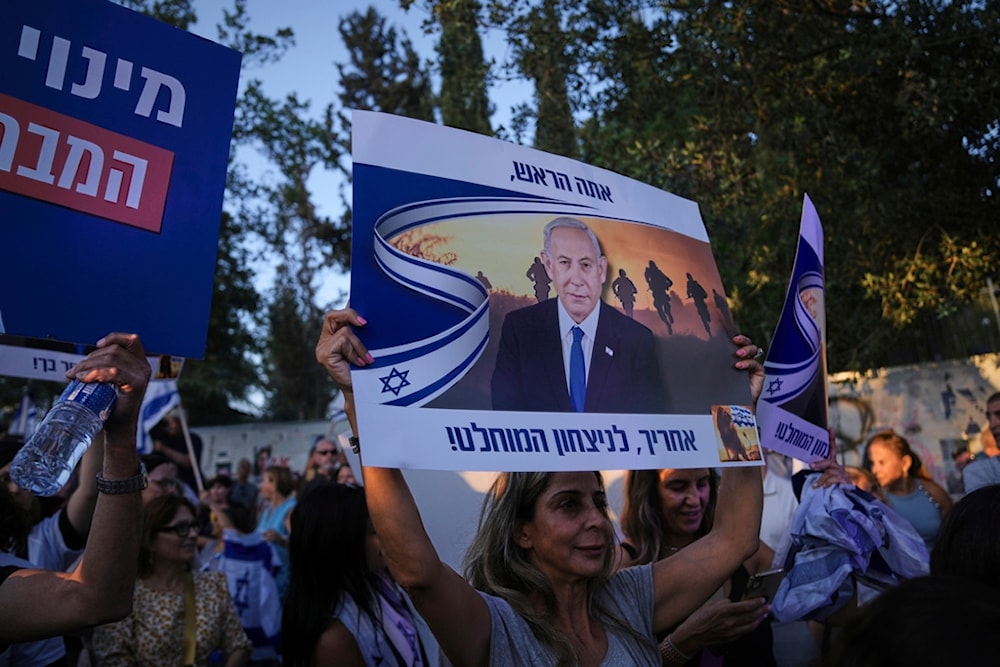Israeli ultra-orthodox party to vote for Knesset dissolution
The Israeli Shas party will support dissolving the Knesset on Wednesday, citing disappointment with Prime Minister Netanyahu.
-

Israelis attend a rally supporting Prime Minister Benjamin Netanyahu outside the Knesset, the Israeli parliament, in occupied al-Quds, Thursday, June 5, 2025. (AP)
The Israeli ultra-Orthodox Shas party announced Monday it will vote in favor of dissolving the Knesset during the upcoming session on Wednesday, marking a major blow to Prime Minister Benjamin Netanyahu’s fragile coalition. The declaration comes amid growing tensions within the ruling alliance, according to a report by the Times of Israel.
"In the current situation, we will vote on Wednesday to dissolve the Knesset," said Shas spokesperson Asher Medina in an interview with Kol Berama Radio.
Medina voiced the party’s dissatisfaction with Netanyahu’s recent performance, stating, "We are disappointed in Netanyahu. We expected action from him earlier, not just in the past few days."
As a longtime ally of Netanyahu’s Likud party, Shas holds 11 seats in the Knesset. A withdrawal of their support could reduce the governing coalition to just 57 seats, stripping it of its majority and potentially triggering new elections.
Ultra-Orthodox threaten withdrawal
The Netanyahu-led coalition entered crisis mode last week when Shas and fellow ultra-Orthodox party United Torah Judaism issued ultimatums, threatening to withdraw from the government unless legislation exempting yeshiva students from military service was passed.
While Netanyahu’s office claimed “significant progress” in negotiations over the draft exemption bill, the ultra-Orthodox parties have maintained their threats, casting doubt on the stability of the government.
According to Israel Hayom, the ultra-Orthodox factions are increasingly inclined to dissolve the Knesset, viewing Netanyahu as a liability. The paper quoted a senior Degel HaTorah official who said all ultra-Orthodox parties had coordinated their voting stance.
Chairman of the National Unity party, Benny Gantz, has also ordered the withdrawal of all party-sponsored legislation from Wednesday’s Knesset agenda, with the exception of a single bill: one that would dissolve the parliament.
The move, announced by the opposition party on Monday, is a direct response to what it described as “the coalition’s decision to introduce dozens of laws to overload the agenda and try to avoid a vote on dissolving the Knesset.”
Gantz’s decision to streamline National Unity’s legislative efforts underscores the growing pressure on Netanyahu’s fragile coalition, which now faces simultaneous challenges from both opposition lawmakers and disillusioned partners within the ruling bloc.
Netanyahu weighs early elections
Speculation is mounting within the Israeli occupation government that Prime Minister Benjamin Netanyahu may soon opt to dismantle his coalition and call for early elections. This follows growing internal unrest over the unresolved issue of Haredi military enlistment, with senior ministers indicating that the premier could choose to act preemptively if the ultra-Orthodox parties appear ready to topple the government.
Last November, Israeli opposition leader Yair Lapid called on the Israeli government to deny public funding, passports, and travel privileges to ultra-Orthodox Jews (Haredim) who refuse to serve in the military. The Haredi community, which accounts for approximately 13% of "Israel's" population, traditionally avoids conscription, dedicating their lives to Torah study.
According to a senior minister who spoke to Zman Yisrael, The Times of Israel’s Hebrew-language sister outlet, “Netanyahu knows there is no solution to the Haredi enlistment matter. He is biding for time and will eventually say that ‘on this important matter, I didn’t cave.’ This way, he’ll at least win the election with the support of reservists and civilians who can’t live with the inequality in military conscription.”
The issue has long polarized the political landscape, while leaders within the ultra-Orthodox community continue to reject mandatory service in the Israeli occupation forces, calling it an effort to secularize their youth. Yeshiva students are instructed to resist enlistment, while successive governments have failed to pass a sustainable law regulating the matter.
Netanyahu may preempt collapse
For years, the Israeli High Court of "Justice" has invalidated any legislation that offers broad exemptions to the ultra-Orthodox community, asserting that such policies violate the constitutional principle of "equality". In a landmark ruling last year, the court found the decades-long exemption framework unlawful, prompting Haredi parties to demand new legislation to legally enshrine their draft avoidance.

 5 Min Read
5 Min Read










